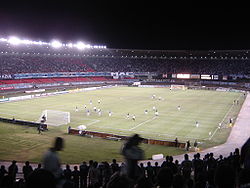| Event | 1991 Supercopa Libertadores | ||||||
|---|---|---|---|---|---|---|---|
| |||||||
| (on aggregate) | |||||||
| First Leg | |||||||
| |||||||
| Date | November 13, 1991 | ||||||
| Venue | Estadio Monumental, Buenos Aires | ||||||
| Referee | Mario Sánchez Yanten (Chile) | ||||||
| Second Leg | |||||||
| |||||||
| Date | November 20, 1991 | ||||||
| Venue | Mineirão, Belo Horizonte | ||||||
| Referee | Mario Sánchez Yanten (Chile) | ||||||
The 1991 Supercopa Libertadores Finals were the finals of the fourth edition of the Supercopa Libertadores football tournament. It was contested by Argentine club River Plate and Brazilian side Cruzeiro, which played their second Supercopa final.
Contents
The first leg of the tie was played at Estadio Monumental in Buenos Aires, River Plate won 2–0. In the second leg, held in Mineirão in Belo Horizonte, Cruzeiro won 3–0. [1] [2] As both teams equaled on points, Cruzeiro won the series 3–2 on aggregate, thus achieving their first Supercopa trophy. [3] [4]

